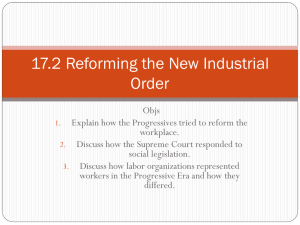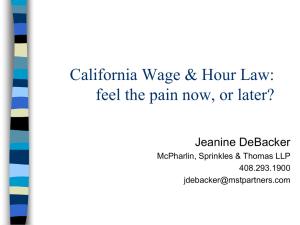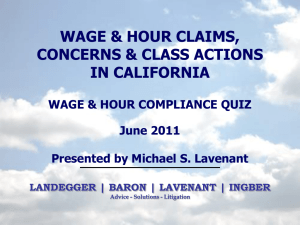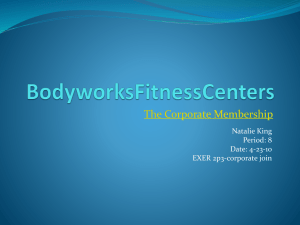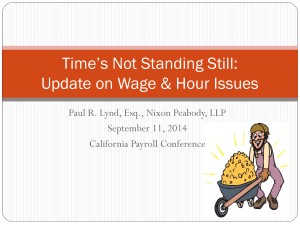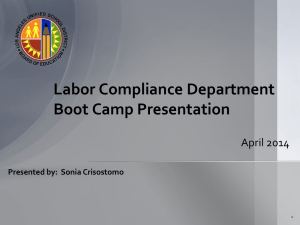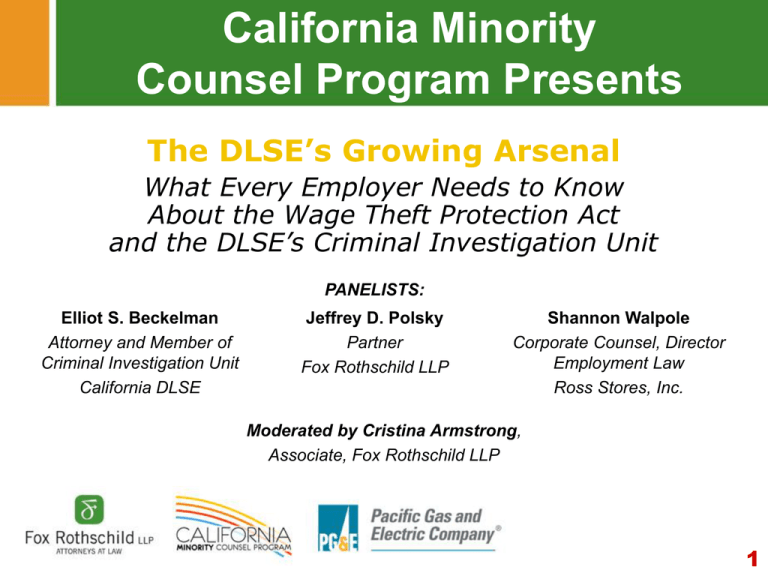
California Minority
Counsel Program Presents
The DLSE’s Growing Arsenal
What Every Employer Needs to Know
About the Wage Theft Protection Act
and the DLSE’s Criminal Investigation Unit
PANELISTS:
Elliot S. Beckelman
Attorney and Member of
Criminal Investigation Unit
California DLSE
Jeffrey D. Polsky
Partner
Fox Rothschild LLP
Shannon Walpole
Corporate Counsel, Director
Employment Law
Ross Stores, Inc.
Moderated by Cristina Armstrong,
Associate, Fox Rothschild LLP
1
Panelist
Elliot Beckelman,DLSE
Elliot S. Beckelman currently advises DLSE’s newly formed
Criminal Investigation Unit, and litigates a full range of civil
actions. Previously, he was a San Francisco Assistant District
Attorney from 1995 to 2010. As an Assistant DA, he tried
numerous felony jury trials including homicide, gangs, narcotics,
elder abuse, and general felonies (which included all crimes of
theft), served as Managing Attorney of the Sex Crimes and Career
Criminal units, headed the task force on the investigation of child
sexual abuse allegations within the S.F. Archdiocese, and was cocounsel of a year-long DNA admissibility hearing which led to the
acceptance of DNA technology in San Francisco courts. He is coauthor of two chapters in the CEB publication (2012), Scientific
Evidence in California Criminal Case. In 1995, he partnered with
the law firm of Leonard Carder in a class action against The
Mitchell Brothers Theatre for misclassifying their exotic dancers as
independent contractors. He also served as in-house counsel for
San Francisco’s largest private union, Hotel Employees &
Restaurant Employee’s Union, Local 2.
2
Panelist
Jeffrey Polsky, Fox Rothschild
Jeff focuses his practice on business and employment litigation and
counseling. He represents clients in disputes relating to claims of
discrimination and harassment, trade secret violations, wage and hour
compliance, wrongful discharge, and breach of contract. Recognizing
the risk and expense inherent in litigation, Jeff has extensive experience
in alternative methods of resolving disputes, including mediation. In
addition to his litigation practice, Jeff advises and counsels employers
on a wide range of employment law issues, including reorganizations,
terminations, corrective actions, developing policies, investigating
misconduct and accommodating disabilities. Jeff also represents
employers in collective bargaining, arbitrations, and National Labor
Relations Board proceedings. Prior to joining the firm, Jeff was a
partner with Kauff McClain & McGuire LLP in San Francisco, CA, where
he practiced for nearly 20 years. Jeff earned an A.B. at the University
of California, Berkeley, and a J.D. from the University of California,
Hastings College of the Law.
3
Panelist
Shannon Walpole, Ross Stores, Inc.
Shannon Walpole has been the Director of Employment Law at
Ross Stores, Inc., based in Pleasanton, California, since 2010. In
her position, among other things, Shannon has been responsible
for helping Ross comply with the California Wage Theft Protection
Act requirements in California. Prior to joining Ross, Shannon
was General Counsel for the Golden Rain Foundation of Walnut
Creek. She began her legal career as an associate at Littler
Mendelson, P.C. Shannon earned her B.A. in Political Science
from the University of California at Santa Barbara and her J.D.
from Santa Clara University School of Law.
4
What Will We Cover?
Wage Theft Protection Act’s Wage
& Hour Notice to New Employees
DLSE’s Criminal Investigation Unit
5
Written Wage & Hour Notice:
Labor Code § 2810.5 (1/1/12)
1. At the time of hiring, an employer shall
provide each employee a written notice, in
the language the employer normally uses to
communicate employment-related
information to the employee, basic
employment information
2. Labor Commissioner must have a template
3. Employer shall notify employees in writing of
any changes to the information within 7
calendar days of the changes
6
Wage Notice:
What Must I Include?
1.
All rates & basis (hourly, shift, daily, weekly,
salary, commission, etc.) of pay, including OT
rates
2.
Minimum wage allowances, if any, including
meal and lodging allowances
3.
Regular payday
4.
Employer’s Legal Name, incl. “dba” names
7
Wage Notice:
What Must I Include?
5. Physical and mailing address of
employer’s main office/principal place
of business
6. Employer’s phone number
7. Contact info of employer’s W/C
insurance carrier
8. Any other info Labor Commissioner
deems material or necessary
8
What does the DLSE Require
as “Material & Necessary?”
Information re staffing agency
Information re written agreements to
providing the rate
- No longer have to try to respond to
whether Employment Agreement is Oral or
Written
9
Who Must Provide
Wage Notices?
All employers who “engage another . . . to do
something for the benefit of the employer or a
third person” in California.
Best Practices:
-
Any employer that has employees in California
should provide notice to California employees
Any employer in California should provide notice
to all employees
Including:
-
Private employers
Private schools
Non-profit corporations (CMCP)
Private sub-contractors
10
Who Must Provide
Wage Notices?
Exceptions:
Public employees
Exempt employees
Most employees covered by collective
bargaining agreements
11
When Must the
Notice be Given?
At the time of hiring
- Hiring date vs. start date
- No later than the start date
Best Practice: Give the Notice to existing
employees if you haven’t already.
12
Do I have to
Update the Notice?
Employers must notify employees in writing of
any changes to the info in the Notice within 7
calendar days of the change
Unless:
- All changes are reflected in timely wage
statement
- Employer provides notice of changes in
another writing required by law w/in 7 days
13
What if my Employees Speak
Different Languages?
Notice must be given in language normally
used to communicate employment-related
information
Labor Commissioner has templates in six
languages:
1. English
4. Korean
2. Vietnamese
5. Tagalog
3. Chinese
6. Spanish
14
What Wage Notice Records
Must I Maintain?
Record of Notices provided
- Can be electronic
Best Practices:
- Acknowledgement of Receipt
-
But cannot require employees to sign
Acknowledgement
Maintain Acknowledgement for 4 years after
termination
15
Wage Notice:
What Else do I Need to Know?
DLSE templates and FAQs:
http://www.dir.ca.gov/dlse/FAQsNoticeToEmployee.html
Not necessary to use template, but
Notice must contain all info in
DLSE’s template
If you prepare your own Notice form,
it must be a free standing form
16
Established Feb. 27, 2012
Designed to investigate employers who perpetrate wage theft and
other criminal activities against workers
Labor Commissioner designates peace officers who have power to
arrest and serve processes and notices.
Labor Code § 95(a):“enforce all labor laws of state … not specifically
vested in any other agency”
No civil liability for false arrest or false imprisonment if acting within
scope
17
What is CIU’s Focus?
Flagrant mistreatment of workers
- Not innocent violators
Workers Compensation violations
Wage theft
Payment of wages with bounced
checks
Unlicensed farm labor contractors/
Garment mfr’s
Public works projects kickbacks
Minor worker violations
18
How does the CIU work?
1. Identify violations
2. Investigate cases
3. Prosecutable
• Present package to District Attorney
• Be available as an expert
• Testify – proper 115 qualified
• Victim support – e.g. immigration
issues, partner non-profits
19
Increased enforcement efforts
August 7, 2012: Joint DLSE/DOL
Inspection of Garment Manufacturing
Businesses, Downtown Los Angeles
L.C. Julie Su is 1st L.C. recognized as Top
Labor & Employment Attorney in
California
Increased efforts to enforce citations
Most common violations:
1. Failure to carry workers’ compensation
2. Failure to pay overtime compensation
20
Thank you!
For any questions, please contact:
Jeffrey Polsky, jpolsky@foxrothschild.com
Cristina Armstrong, carmstrong@foxrothschild.com
Tyreen Torner, ttorner@foxrothschild.com
21


